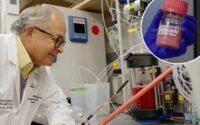Stressed Wall Street execs flock to ketamine therapy sessions
Therapy’s a trip for these Wall Street executives.
Wealthy stock traders are flocking to a Manhattan-based ketamine therapy practice that doles out the hallucinogenic drug in a lavish setting to treat depression, stress and burn-out syndrome, according to the psychiatrist who runs it.
The Jeff Ditzell Psychiatry center in the Financial District legally doses patients with the drug — best known as a psychedelic party favor — via IV drip for $750 a pop, Ditzell told The Post Wednesday.
“We see a lot of Wall Street traders,” Ditzell said, adding 30 to 40% of his clients work in the financial industry.
“You could say they’re coming in droves. It’s a high-stress job and these humans are performance-driven.”
During the sessions, patients slip on headphones and recline in a pod-like leather chair while surrounded by abstract art, plants and aroma therapy.


“The experience of the infusion is enjoyable for most people. It’s mildly psychedelic,” he said. “If you pay attention to warmth, lighting, comfort, you get a better effect.”
“In the majority of people, it works and rapidly,” Ditzell said, adding there’s often a “50% reduction of stress and anxiety.”
Patients wear a sleeping mask while receiving 40-minute-long infusions of the drug, which was first used as a horse tranquilizer, and has since been shown to help some cases of depression and post-traumatic stress.
Ditzell’s clinic has attracted scores of executives from nearby Wall Street, who want to “hack their neurochemistry” with “performance-based coaching” in order to “boost productivity,” Ditzell said. Many patients supplement the infusions with talk therapy for an additional fee.


People with debilitating depression who have unsuccessfully tried other forms of treatment can legally do ketamine at clinics in New York and across the US. It’s a schedule III drug but and can be prescribed “off-label” treatment for depression in private clinics.
In recent years, ketamine clinics have popped up in New York at a rapid rate, along with other US cities like Houston, Miami, Los Angeles and Seattle.

An estimated 100 treatment centers nationwide now offer the service compared to just a handful a decade ago.
Their popularity comes after several recent studies showed a low dose of the drug may help treat depression and PTSD.


